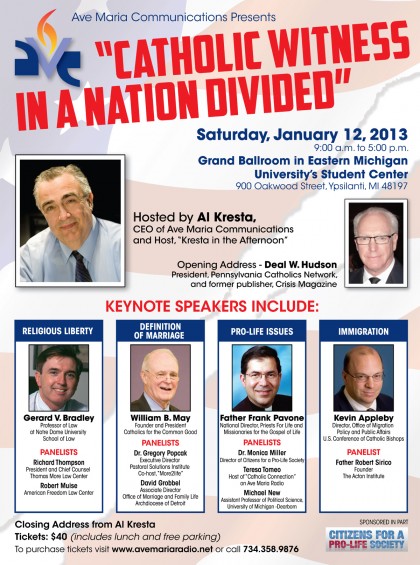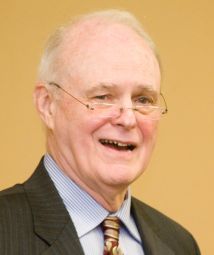The Circle of Irreplaceability: Making the Case for Marriage
Devra Torres | Jan 25, 2013 | 3 cmts
Last week, I wrote about a very memorable conference presented by Ave Maria Communications and Citizens for a Pro-Life Society.

In fact, I got so effusive about Al Kresta’s leitmotif:--the need for laypeople to wake up to our own irreplaceable mission—that I got no further than his own remarks. He’s right: the “intentional discipleship” to which we’re called is a far richer and more adventurous thing than a call to cavail—even justifiably—at the politicians, bishops, and other leaders who helped get our country into this mess. Passivity, whether resigned

or exasperated,

is nobody’s personal vocation.
Today, though, I want to address a couple of William B. May’s most eye-catchingly personalist ideas about marriage. May is the author, most recently, of Getting the Marriage Conversation Right,

and his talk was worth hearing in full (the whole conference will soon be available on DVD from Ave Maria Radio), but here are some highlights:
First of all, how to define marriage so as to have a fruitful conversation about it?
May mentioned (as I also noted recently) that the redefinition of marriage is nothing new. Severing marriage from gender is only the latest and most bizarre (so far) phase of its ongoing evolution.

No-fault divorce redefined marriage as an adult-centered institution that’s all about the happiness (or at least the superficial satisfaction) of those adults.

The mainstreaming of casual contraception further detached the idea of marriage from that of children.
One way to draw people back to reality, May suggested, is to supply a missing link: the child’s point of view. As the debate stands now, no one’s looking at marriage through the child’s eyes.

Once we do so, we realize that
Marriage is the only institution we have that unites children with their mothers and fathers.
Of course, not all couples have children--but all children have a mother and a father. They may be deprived of them (by design or misfortune), but if so, that's not just a neutral variation. If children have rights, and they do, then surely high among these is the right to be born to a father and mother united to care for them.

Or, as Donum vitae puts it,
The child has the right to be…brought up within marriage: it is through the secure and recognized relationship to his own parents that the child can discover his own identity and achieve his own proper human development.
Yet we’re proposing to eliminate the only institution that unites kids with their mothers and fathers.
Marriage unites a man and a woman with each other and with any children born of their union. In other words—here comes the personalist part—
Through marriage, a man and woman choose to make themselves irreplaceable to each other.
Moreover, once they have children, they become irreplaceable to those children, and vice versa.
As May puts it,
Marriage starts the circle of irreplaceability that we call the family.
Personalism already affirms that each of us is, in reality, irreplaceable and unrepeatable. But a further layer is added when that truth meets free will: by choosing this husband, I freely make myself irreplaceable to him and him to me, and to any children born to us, who then become irreplaceable to each of us.
We were already objectively unrepeatable and irreplaceable. You could say marriage makes us “subjectively irreplaceable,” too—per se and to each other. We’re not just fungible functionaries.

There’s plenty of sociological evidence that children in general do better when raised with a biological mother and father committed to each other and to them. The question to ask, May insists, is:
Do we need an institution that unites kids with their moms and dads? Yes or no?
If we do, then one man/one woman marriage is that institution. But if you think we don't--how do you justify eliminating it? Let's put the burden of proof where it belongs: on those who propose abolition by redefinition.
Some do refuse to acknowledge the value of this institution. The Obama administration has asserted that there’s no state interest in a legal structure that promotes children being raised by their biological parents.
This child's-eye view of marriage

avoids entanglement in debate on the morality of homosexuality, which May called a pastoral, not a policy issue. I'm not completely sold on that, though it's certainly a simpler route to public persuasion. I'd be interested to know what other readers think.
In any event, when confronted with questions like
- Shouldn’t we allow everyone to marry the person they love?
- Don’t gays have the right to love, and have their love validated?
- What about the civil rights and equal treatment of homosexual persons?
May advocates refusing to be sidetracked and asking instead: Well, what does that have to do with abolishing the only institution that unites children to their mothers and fathers?
A much more complete treatment of this approach can be found at the Catholics for the Common Good Institute

I'd like to close with a minor but winsome point that caught my personalist eye--not a matter of public policy, just a very perceptive and practical insight: May meditates, he said, on God’s love for his wife “just the way she is, even with all the flaws I hate.” He catches his own tendency to “try to tweak her so she’ll be a little better for me,”—and realizes that “I can’t have a proper relationship with God if I’m doing that.”
That captures something: the difference between willing the good of the other and willing the ostensible good of the other for me--that hint of utilitarian manipulativeness that shifts us away from the truth about the person.
I'd welcome comments on May's approach. Do you think the focus on children gives short shrift to the unitive dimension of the sacrament? (I don't, but if you do, let's talk!) Do you think it's a good approach? Do you think it's likely to be fruitful in public? Do you think it does justice to the nature of marriage? Let me know.
In the meantime, I'll be working to bring you a personalist synopsis of the immigration talk.


Comments (3)
Katie van Schaijik
Jan 25, 2013 6:21pm
Love this point:
This came out in Jules' Person class: A key thing about other persons is that we're not to view them or treat them as if they're mainly about us and their relation to us.
Hard to break that habit of egotism, isn't it?
I like May's perspective a lot. But I still want to see more work done on contrasting the fullness of conjugal love with the essential limits of same-sex liaisons.
Not only does marriage link children to parents, it joins the two halves of the human whole in a stable, complete, life-giving union of mutual love, respect, and care. SSM doesn't do that. It can't. By the nature of the case, it's lop-sided, incomplete and unstable. Also sterile.
May comes pretty darn close with that "circle of irreplaceability though." Great stuff!
Devra Torres
Jan 26, 2013 3:20pm
Yes, there's a saying that goes something like "Egotism dies half an hour after the person does."
I'm coming to see the importance of the whole debate more clearly than I did. And there's a parallel to the public conversation about the HHS mandate: some say: Look, this is not about contraception; it's about religious freedom. We can be on the same side of this regardless of whether we agree about the morality of contraception. Others, on the other hand, say: No, it's a good thing that we get clear in our own minds, and communicate, just what is wrong with contraception.
In the same way, I can see the merits of steering the public discourse around to the child-s eye view of marriage, and not letting people wiggle out of shouldering the burden of proof, and I can also see the value of a simultaneous conversation about what it is about same-sex liasons that make "same-sex marriage" impossible--rather than a right that shoudl or shouldn't be denied.
Katie van Schaijik
Jan 26, 2013 6:55pm
I agree, Devra. We need to learn to consider this question from all angles. Similarly, pro-lifers have had to learn to look at the issue from all different perspectives—the rights of the unborn baby, the suffering of the mother, the consequences of promiscuity, the problem of shame...